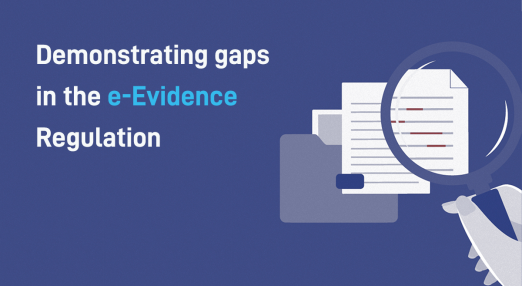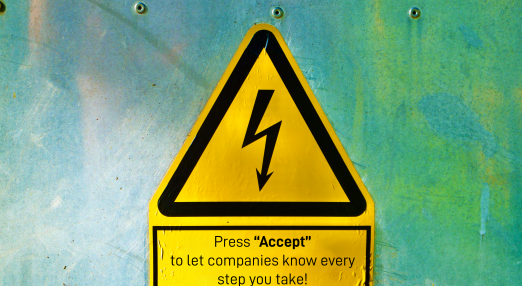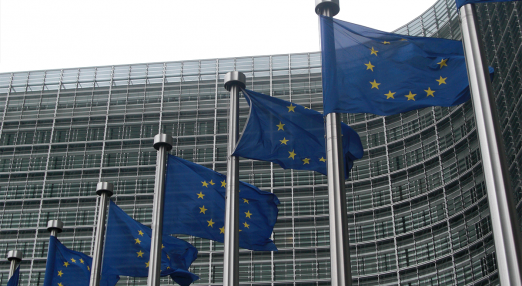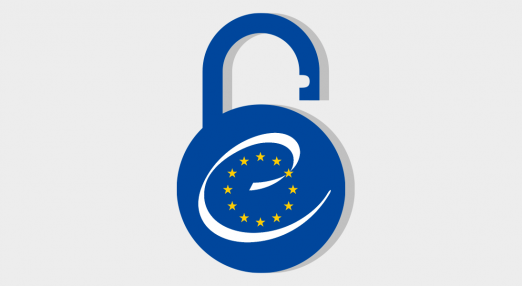Booklet: Demonstrating gaps in the e-Evidence Regulation
The Regulation on cross border access to data by law enforcement (so-called “e-Evidence” Regulation) threatens to put the rights of journalists, lawyers, doctors, social workers and individuals in general at great risk. EDRi and 13 civil rights organisations have just launched four scenarios that clearly depict how our future could enfold if the Regulation is approved.
Filter resources
-

Booklet: Demonstrating gaps in the e-Evidence Regulation
The Regulation on cross border access to data by law enforcement (so-called “e-Evidence” Regulation) threatens to put the rights of journalists, lawyers, doctors, social workers and individuals in general at great risk. EDRi and 13 civil rights organisations have just launched four scenarios that clearly depict how our future could enfold if the Regulation is approved.
Read more
-

Bugs in our pockets?
Now, in Bugs in our Pockets: The Risks of Client-Side Scanning, the authors take a long hard look at the options for mass surveillance via software embedded in people’s devices, as opposed to the current practice of monitoring our communications. Client-side scanning, as the agencies’ new wet dream is called, has a range of possible missions. While Apple and the FBI talked about finding still images of sex abuse, the EU was talking last year about videos and text too, and of targeting terrorism once the argument had been won on child protection.
Read more
-

Press “Accept” to let companies know every step you take
When you download a free app and accept their privacy statement, did you know that you may just have allowed data about your movement to be sold freely to anyone who’s willing to pay? EDRi's member Elektronisk Forpost Norge (EFN) shares more.
Read more
-

How a company illegally exploited the data of 14 million mothers and babies
If you’re in the UK you may know Bounty by the packs of samples they distribute to pregnant women at midwife apps. You might not know that they were also found to have illegally shared data of +14 million mums and babies with 39 companies. Bounty collected personal data from a variety of channels both online and offline: its website, mobile app.
Read more
-

Final push needed for a strong ePrivacy Regulation
Today EDRi and 17 civil rights organisations reiterate our support for the much-needed efforts to upgrade Europe’s ePrivacy legislation.
Read more
-

What’s up with WhatsApp encrypted backups
WhatsApp is rolling out an option for users to encrypt their message backups, and that is a big win for user privacy and security. The new feature is expected to be available for both iOS and Android “in the coming weeks.” EDRi's member Electronic Frontier Foundation (EFF) has pointed out unencrypted backups as a huge weakness for WhatsApp and for any messenger that claims to offer end-to-end encryption, and we applaud this improvement. Next, encryption for backups should become the default for all users, not just an option.
Read more
-

Human rights focus missing in the State of the Union 2021 address
On 15 September, the yearly State of the Union 2021 address took place. The address is the event where the European Commission evaluates the preceding year and the Commission President announces key legislation or reactions to crucial international events.
Read more
-

Register research turned privacy disaster. Epicenter.works nominates Sebastian Kurz for a Big Brother Award
Research is important. Using research as a cover to obtain unchecked access to sensitive official data is not. At the beginning of July, the Austrian chancellor, Sebastian Kurz, submitted to pre-parliamentary consultation a bill that would cause a seismic shift in how the government treats its citizens’ data. EDRi's member epicenter.works shares that from a privacy perspective the present bill is fundamentally flawed and places an enormous amount of data covering the entire population at risk for abuse.
Read more
-

EFF to Council of Europe: Flawed Cross Border Police Surveillance Treaty Needs Fixing
EDRi member Electronic Frontier Foundations (EFF) has joined European Digital Rights (EDRi), the Samuelson-Glushko Canadian Internet Policy & Public Interest Clinic (CIPPIC), and other civil society organizations in recommending 20 solid, comprehensive steps to strengthen human rights protections in the new cross border surveillance draft treaty that is under review by the Parliamentary Assembly of the Council of Europe (PACE). The recommendations aim to ensure that the draft treaty, which grants broad, intrusive police powers to access user information in criminal cross border investigations, contains a robust baseline to safeguard privacy and data protection.
Read more
-

EU: €5 million for new wiretapping technologies
The European Commission has made €5 million available for research projects that aim to help law enforcement authorities maintain the ability to intercept telecommunications – something which is threatened by the adoption of new technologies such as 5G networks and “edge computing”.
Read more
-

UK Investigatory Powers Tribunal finds the regime for bulk communications data to be incompatible with EU law
The UK Investigatory Powers Tribunal issued a declaration in EDRi member Privacy International's challenge to the bulk communications data regime, finding UK legislation to be incompatible with EU law.
Read more
-

iSpy with my little eye: Apple’s u-turn on privacy sets a precedent and threatens everyone’s security
Apple has just announced significant changes to their privacy settings for messaging and cloud services: first, it will scan all images sent by child accounts; second, it will scan all photos as they are being uploaded to iCloud. With these changes, Apple is threatening everyone’s privacy, security and confidentiality.
Read more
